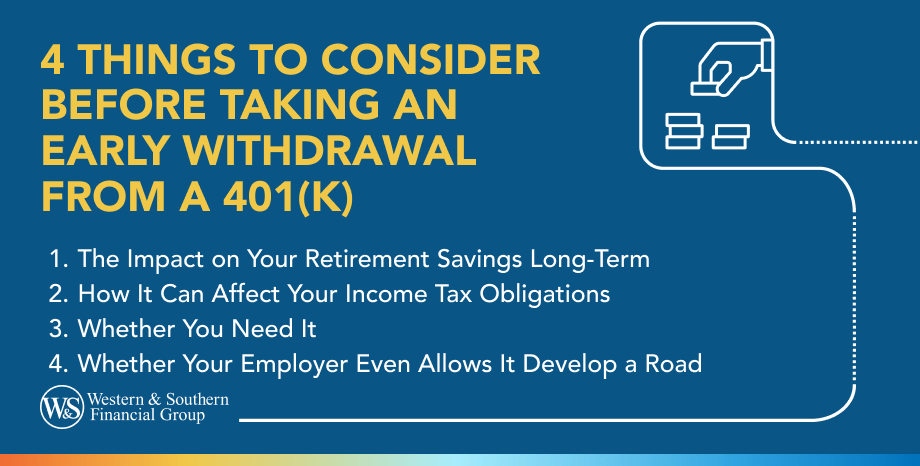

Table of Contents
Key Takeaways
- Early withdrawals from a 401(k) can have significant long-term impacts on your retirement savings, potentially reducing the tax-advantaged growth potential over time.
- Taking an early withdrawal triggers income tax obligations, which may result in a larger tax bill that should be carefully considered.
- Assess the urgency of your financial need before considering an early withdrawal; if it's not critical, explore other alternatives to avoid compromising your retirement savings.
- Verify with your employer's HR department whether early withdrawals are allowed under your plan, as not all plans permit this option.
When you need extra money to cover expenses, you could borrow from your emergency fund or work extra hours to boost your income. An early withdrawal potentially comes with tax consequences — including a 10% penalty — and long-term retirement planning considerations.
Here's what to know before you go this route.
What Is an Early Withdrawal?
Generally, you can begin to take money out of a retirement account without incurring the 10% penalty once you reach age 59 1/2. However, if you are age 55 or older — and your plan allows — you can withdraw money from your 401(k) if you leave your job the same year you turn 55 or if you only withdraw from the retirement account your most recent employer offered. You could also make a hardship withdrawal because of a permanent or temporary disability or an immediate and heavy financial need.1
Understanding the Age Requirements for Early Withdrawals
Understanding these age requirements is important because taking an early withdrawal typically comes with a 10% penalty on the money you withdraw, in addition to the taxes you have to pay on the money at your current income tax rate. For example, if you are 40, decide to take a $25,000 early withdrawal from a traditional 401(k) and are in the 25% tax bracket, this $25,000 will be taxed at your 25% income tax rate as well as at the 10% penalty rate.
Changes to Age Requirements Due to COVID-19
This situation would be the case during "normal times." However, because of the economic uncertainty related to COVID-19, the federal government temporarily changed the rules around taking early withdrawals. The rule change, which was part of the CARES Act and expired on December 30, 2020, allowed individuals to take up to $100,000 or 100% of their balance (whichever is less) from their retirement account without facing the 10% penalty — even if they were under age 59 1/2.2
1. The Impact on Your Retirement Savings Long Term
When you take an early withdrawal from your retirement account, you could potentially miss out on the tax-advantaged growth that comes with that money. Though the stock market goes up and down every day, time in the market is one the key reasons many people are able to grow their retirement savings over a 30- or 40-year career.
It takes time for that $50 you invest today to potentially grow to hundreds or thousands of dollars in the future. Taking money out of retirement accounts early could reduce this potential growth.
2. How It Can Affect Your Income Tax Obligations
Early withdrawals from a traditional 401(k) or other retirement plan count as income, which means the withdrawn money will be subject to income tax. Determine whether accessing your money early is worth the trade-off of a potentially larger tax bill.
3. Whether You Really Need It
Before taking an early withdrawal, it's best to ask yourself how critical your need for it is. If you have urgent expenses without adequate funds to cover them, the option to withdraw money is likely attractive. However, if you'd like to access the money just to pad your savings because you're uncertain about what the future holds, taking an early withdrawal may not be the best option. It might be better to explore alternatives, such as relying on your emergency fund, cutting expenses or launching a side hustle to increase your income.
4. Whether Your Employer Even Allows It
It's important to keep in mind that some plans may not allow early withdrawals. If you've been thinking about taking an early withdrawal, talk to your employer's HR department to find out if this option is available to you.
Should You Take an Early Withdrawal?
Taking an early withdrawal from a 401(k) or another retirement plan could give you more financial flexibility when you need it most. But even though this is technically your money, withdrawing it before age 59 1/2 could increase your taxable income and, in turn, your tax bill.
The Bottom Line
Even more importantly, taking out the money could affect your long-term retirement savings. You've likely spent years diligently setting aside this money so you can enjoy a comfortable retirement. Before you make an early withdrawal, consider this larger goal and ask yourself whether it's even worth it.
Sources
- Retirement Topics - Hardship Distributions. https://www.irs.gov/retirement-plans/plan-participant-employee/retirement-topics-hardship-distributions.
- Coronavirus-related relief for retirement plans and IRAs questions and answers. https://www.irs.gov/newsroom/coronavirus-related-relief-for-retirement-plans-and-iras-questions-and-answers.















